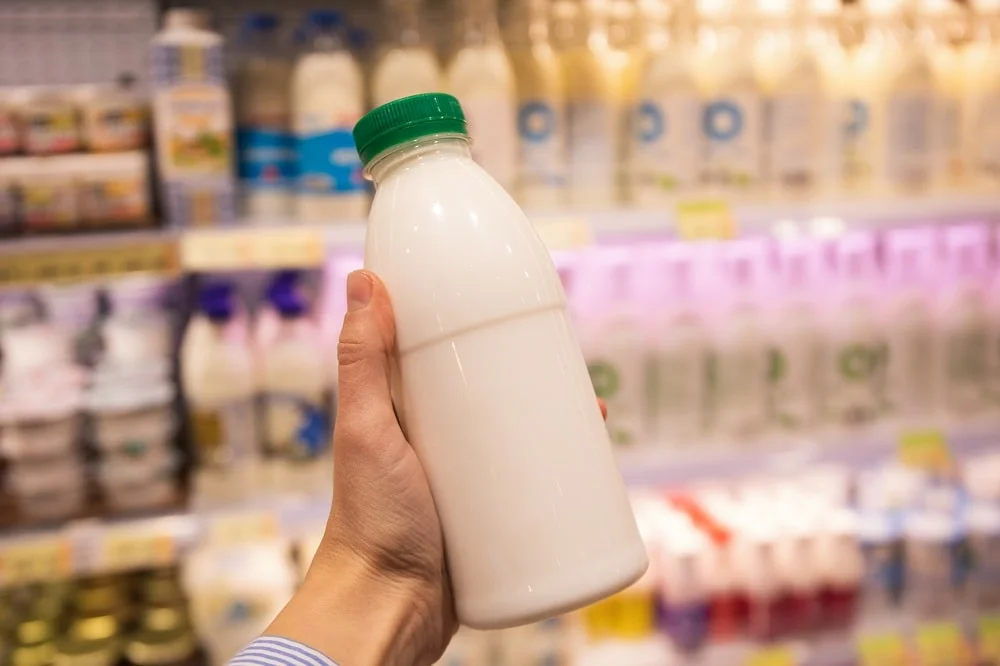Can French Bulldogs Drink Milk?

In our journey of caring for French Bulldogs, a common question arises: Can French Bulldogs Drink Milk?
“Quick Fact: French Bulldogs can indulge in a bit of milk, but be cautious as some may be lactose intolerant. Monitor your pup’s response for a joyful and comfortable experience!”
It’s more than curiosity; it’s about understanding what’s best for our furry friends. Join us as we explore this question and make informed decisions to keep our beloved French Bulldogs healthy and happy.
Can French Bulldogs Drink Milk Safely?
Ensuring your French Bulldog’s dietary safety is vital, especially regarding the consumption of milk. Despite the iconic image, many adult dogs, including French Bulldogs, are lactose intolerant. The ability to digest lactose diminishes with age, posing a potential challenge.
However, individual tolerance varies, and some Frenchies may handle small amounts of milk well. To prioritize your Frenchie’s well-being, closely observe their reaction and consult a veterinarian for personalized dietary advice.
Is Milk Good or Bad for French Bulldogs?

The dietary landscape for French Bulldogs is a tapestry of considerations, and the role of milk prompts a discerning evaluation. Let’s explore the intricate interplay between French Bulldogs and milk to ascertain whether this classic beverage is a boon or a potential bane for our beloved companions.
In the realm of French Bulldog nutrition, the question of whether milk is a beneficial addition or a dietary hazard beckons a closer inspection. Milk, often synonymous with nourishment, is a complex concoction of proteins, fats, and lactose, which can have varying impacts on the delicate digestive systems of French Bulldogs.
Are French Bulldogs Lactose Intolerant?
Delving into the peculiarities of French Bulldogs and lactose intolerance unfurls a layer of complexity in their dietary preferences.
What is Lactose Intolerance?
Lactose intolerance in French Bulldogs results from a deficiency in lactase, the enzyme responsible for breaking down lactose, the natural sugar present in milk. This deficiency, prevalent among many adult dogs, implies a potential challenge in digesting milk.
Symptoms of Milk Intolerance

The manifestation of milk intolerance in French Bulldogs manifests in subtle yet telling signs, acting as a barometer for the compatibility of this dairy delight with their digestive equilibrium.
Vomiting: Vomiting, a distressing reaction, may ensue when a French Bulldog is lactose intolerant. This expulsion of stomach contents can be a visible indicator of the digestive struggles associated with milk consumption.
Diarrhea: Another telltale sign of milk intolerance is diarrhea. The disruption in the digestive process can lead to loose, watery stools, signaling an imbalance in the digestive harmony of French Bulldogs.
Lethargy: Lethargy, an unusual lack of energy, might accompany milk intolerance in French Bulldogs. This could be a result of the discomfort and distress caused by the body’s struggle to process lactose.
Upset Stomach: An upset stomach, marked by discomfort and unease, can be a general symptom of milk intolerance in French Bulldogs. This gastrointestinal disturbance underscores the importance of understanding the nuances of their dietary needs.
Health Risks of Feeding Milk to French Bulldogs
Sharing a bowl of milk with our French Bulldogs carries potential health considerations. While the allure is undeniable, understanding the nutritional intricacies is crucial. Proteins for muscles, calcium for bones, and fats for a glossy coat all are in play.
Yet, the challenge lies in balancing these elements, particularly the calories that could impact weight. Navigating the health risks allows us to make thoughtful choices, ensuring that each treat moment enhances the well-being of our beloved French Bulldogs.
Nutritional Value of Milk

Milk, often celebrated for its nutritional richness, encompasses a spectrum of vital elements crucial for a dog’s health. Understanding these nutritional components delves into the core of the potential risks entailed in offering milk to French Bulldogs.
Nutrition
In the realm of French Bulldog sustenance, the overarching nutritional profile of milk sets the stage for potential health considerations. It’s a blend of proteins, fats, and carbohydrates, each playing a distinctive role in the delicate balance of their dietary needs.
Protein
Protein, a cornerstone of muscular development, holds prominence in the nutritional equation of milk. Unraveling the protein content in milk offers insights into its potential impact on a French Bulldog’s muscle health.
Calcium
Calcium, vital for skeletal strength, is another key component in milk. Delving into the calcium content provides a window into its role in bolstering bone health, a crucial consideration in the overall well-being of French Bulldogs.
Fat
Fats, beyond their caloric contribution, are integral to coat health and overall vitality. Analyzing the fat content in milk sheds light on its potential influence on a French Bulldog’s energy levels and the luster of their coat.
Calories
Calories, the energy currency of nutrition, are inherent in milk. Understanding the caloric content becomes paramount in the context of weight management for French Bulldogs, ensuring a delicate equilibrium in their dietary intake.
Can French bulldogs drink milk alternatives?

Choosing milk alternatives for your French Bulldogs is a thoughtful move for caring pet parents. The variety of non-dairy options caters to your furry friend’s unique tastes and potential sensitivities.
Whether it’s the nutty richness of almond milk or the creamy goodness of oat milk, these alternatives offer not just a tasty change but also provide essential nutrition. Soy milk and goat’s milk bring a plant-based protein boost and a distinctive taste that your French Bulldog might love. Beyond being delicious departures from regular cow’s milk, these alternatives address potential issues like lactose intolerance.
As someone deeply invested in French Bulldog well-being, I wholeheartedly recommend trying out milk alternatives to ensure your furry companion enjoys a diverse and nourishing diet.
Alternatives to Cow’s Milk for French Bulldogs

In the rich tapestry of alternatives, a spectrum of non-dairy options beckons, each offering a distinctive profile that intersects with the unique dietary needs of French Bulldogs.
- Almond Milk
Almond milk, an almond-derived elixir, emerges as a noteworthy contender. Rich in unsaturated fats and low in calories, it caters to French Bulldogs with a proclivity for a nutty essence.
- Oat Milk
Oat milk, a cereal-based delight, steps into the spotlight. With a creamy texture and a trove of essential nutrients, it provides a wholesome alternative for French Bulldogs with a penchant for grain-based indulgences.
- Coconut Milk
Coconut milk, derived from the exotic coconut, boasts a distinctive flavor profile. Its richness in lauric acid, a medium-chain fatty acid, contributes to a unique nutritional composition for French Bulldogs with a taste for the tropics.
- Soy Milk
Soy milk, a soybean-derived concoction, introduces a plant-based protein punch. Its versatility aligns with the diverse dietary needs of French Bulldogs, offering an alternative brimming with essential amino acids.
- Goat’s Milk
Goat’s milk, a departure from bovine derivatives, presents a novel option. Its digestibility and distinct nutritional attributes cater to French Bulldogs with potential sensitivities, offering an alternative with a distinctive taste.
- Plant-Based Milks
Beyond singular options, a medley of plant-based milk, incorporating ingredients like rice, hemp, or flax, broadens the spectrum. Each variant contributes a unique nutritional profile, allowing French Bulldogs a diverse palette of choices.
- Lactose-Free Milk
Lactose-free milk, crafted to mitigate lactose intolerance concerns, stands as a practical option. Tailored for French Bulldogs with specific sensitivities, it retains the nutritional essence while alleviating potential digestive challenges.
Will my Frenchie get enough calcium without milk?

Rest assured, your Frenchie can thrive without relying solely on milk for calcium intake. While milk is a traditional source of this essential mineral, numerous alternative sources abound to meet your French Bulldog’s dietary requirements.
Incorporating a well-balanced diet rich in calcium-rich foods such as leafy greens, fish, and certain fortified dog foods can provide the necessary nutrients for optimal bone health. In fact, diversifying your Frenchie’s calcium sources ensures a broader spectrum of essential nutrients, contributing to overall well-being.
As an expert in canine nutrition, I encourage a varied and nutrient-packed diet to guarantee that your French Bulldog not only meets but exceeds their calcium needs, fostering strong bones and vitality without relying solely on milk.
Can I Give My French Bulldog Milk for Constipation?
While the notion of using milk to alleviate constipation in French Bulldogs is prevalent, caution is paramount. While milk possesses mild laxative properties, its effectiveness can vary among individual dogs.
It’s crucial to approach this remedy with discretion, introducing small amounts initially to gauge your French Bulldog’s response. Lactose intolerance is a potential consideration, as it may exacerbate digestive issues.
Consulting with a veterinarian before implementing this remedy is advisable, as they can provide tailored advice based on your Frenchie’s specific health needs. Additionally, exploring alternative strategies for constipation relief ensures a comprehensive and well-informed approach to your French Bulldog’s digestive well-being, fostering their overall health and vitality.
Tips for Introducing New Foods to Your French Bulldog’s Diet

Introducing new foods to your French Bulldog’s diet demands a strategic and patient approach. Begin gradually, incorporating small portions of the new food alongside their regular diet.
This allows your discerning Frenchie to acclimate to the change without overwhelming their digestive system. Observing their response is crucial; if there are no adverse reactions, slowly increase the proportion of the new food over several days. Patience is key, as abrupt dietary changes can lead to digestive upset.
Offering a variety of nutrient-rich foods ensures a well-balanced diet, promoting optimal health and well-being. By approaching diet diversification with care and mindfulness, you not only foster a positive culinary experience for your French Bulldog but also contribute to their overall vitality and happiness.
Conclusion
In conclusion, deciphering whether French Bulldogs can drink milk requires a nuanced understanding of their individual needs and tolerances. While some Frenchies may savor milk without issue, others may benefit from carefully chosen alternatives.
Prioritize your Frenchie’s health by consulting with a veterinarian and making informed decisions about their dietary choices. As you navigate the realm of French Bulldog nutrition, tailor their diet to ensure it aligns with their unique preferences and well-being.
FURTHER READING
For information, we have a range of articles discussing the best food and nutrition options, for your French Bulldog as well as tips, on maintaining their health and providing proper care.




